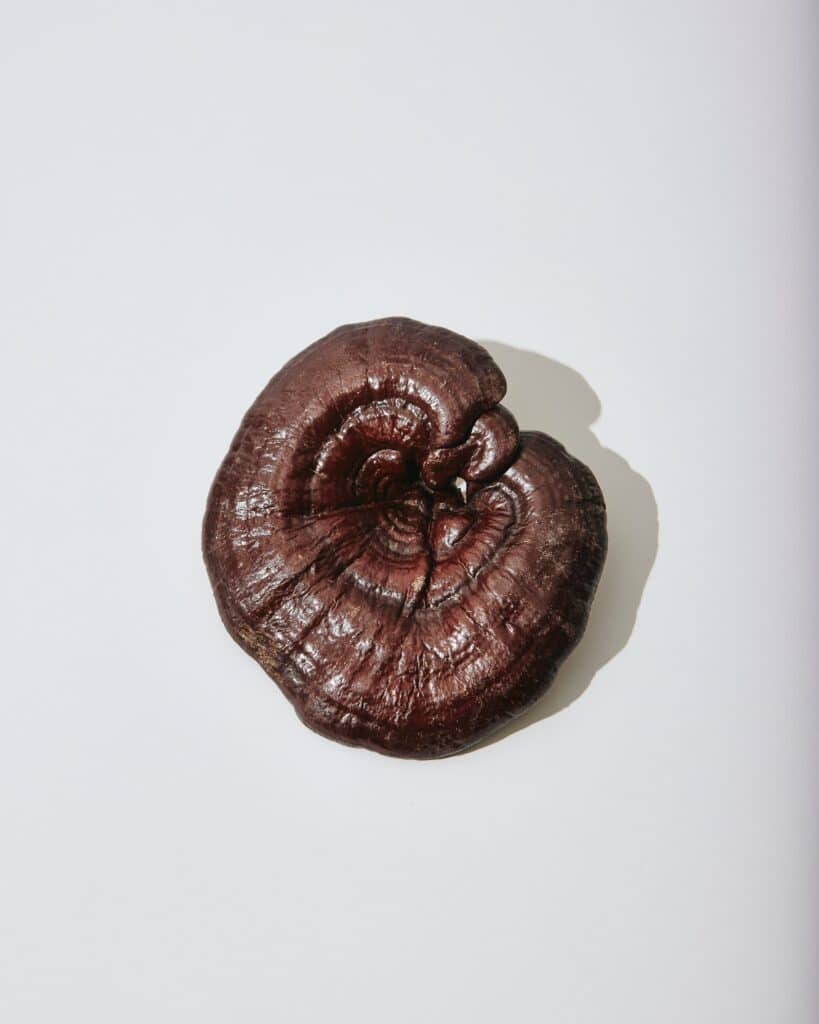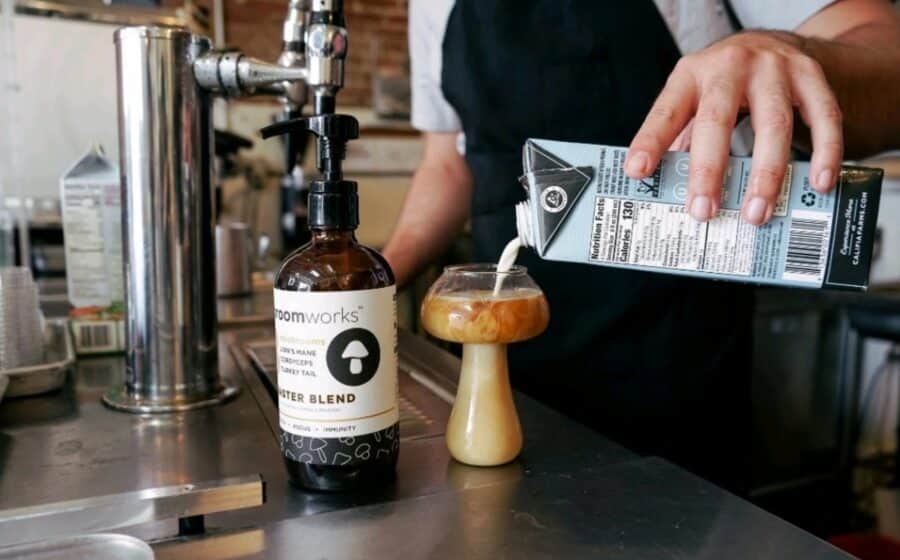Trend forecasters have been watching the functional beverage category since the mid-2010s. Whether it’s turmeric, ginseng, or greens, functional ingredients—or items with a perceived health benefit—are popping up everywhere, including coffee shops and direct-to-consumer (DTC) coffee brands.
If you’ve scrolled through social media or listened to virtually any podcast, you’ve likely heard a lot about mushrooms. Functional mushrooms (not psychedelic mushrooms, which are a whole other type of fungi) are often in powdered or liquid form, which fits in well with coffee, and many brands are experimenting with mushroom and coffee combinations. Mushrooms can be found all over the world, and many cultures have harnessed mushrooms as a functional ingredient for hundreds of years.
But, the beverage industry has a long history of hits and misses in the functional ingredient space, and it can be difficult to tell what’s simply a passing trend and what’s here to stay. Mushrooms are having a moment now, but are they here to stay, and should they be in your coffee? From supplements to movies on Netflix inviting the uninitiated on a deep dive into mycology, mushrooms seem to be popping up everywhere, including on your local café’s menu.
Figuring Out Functional Fungi
Functional mushrooms are a variety of fungi used for their perceived health benefits rather than simply for taste and basic nutrition. Reishi (ganoderma lucidum), lion’s mane (hericium erinaceus) and chaga (inonotus obliquus) are the most popular species in the functional mushroom space, but cordyceps, maitake and shiitake mushrooms are also making their presence known. Reishi mushrooms are large and glossy with a wood-like texture; a lion’s mane mushroom looks white and shaggy; and chaga has a gnarly, tough texture and is found on birch trees.

Reishi and chaga mushrooms specifically are thought to be adaptogens, or plants believed to reduce the effects of stress on the body and show up in non-Western medical practices, particularly in traditional Chinese medicine.
Despite centuries of precedent, public interest in functional mushrooms has grown substantially in the last 10-20 years, says Gregory Ian Robinson, a Ph.D. candidate at the University of Lethbridge who has studied functional mushrooms and their applications for several years. Robinson is also the CEO of Mycos Biotech, a company that “aims to unlock the medicinal potential of psychedelic mushrooms to enhance our lifestyles,” their website states.
Although lots of people are making products with functional mushrooms—according to the US National Library of Medicine, there are more than 100 products made and sold with just reishi mushrooms alone, there’s not a robust collection of research on the topic yet. “We are still in the relatively early stages of mushroom research. Each mushroom contains numerous metabolites that have a wide range of effects,” Robinson says.
A lot of the marketing and packaging of mushroom products claim all sorts of health benefits, but few have the evidence yet to back it up. “Further research is required to develop extraction processes that can target specific metabolites and fractions of the mushrooms,” explains Robinson. “In the meantime, people can try to find what works best for them and rest assured there are minimal to no side effects of most mushroom consumption.”
When Mushrooms Met Coffee
Many food and beverage products currently on the market feature functional mushrooms, including protein powders, supplements, nut milk, hot cocoa, ready-to-drink (RTD) beverages and elixirs. Even celebrities like Taika Waititi and the Duchess of Sussex are jumping on the trend with investments and brand endorsements. Coffee has not escaped this surge: some companies are mixing coffee with mushrooms, while others promote functional mushrooms as an alternative to coffee.
Fungi like chaga, lion’s mane or turkey tail mushrooms can have a strong, bitter taste, so they can pair well with coffee and are well-suited to hot drinks—something Irina Sandberg knows well. “I would compare the aromatic nuances with edible mushrooms as an umami taste added to the coffee flavors. Also, the end result is what I would call a smoother coffee experience with less of the oily feeling that some coffees have in the back of the mouth.”
Sandberg is the founder and Head of Hygge at Rå Hygge, a company based in Finland that sells coffee beans blended with mushrooms. “For the mushrooms to work in the coffee, they need to be water-soluble, so they need to be extracts,” she says. Historically, chaga mushrooms have been made into tea as a coffee substitute in Finland, a tradition stemming from World War II and suggests that mushrooms and coffee are more than just a trendy pairing.
I would compare the aromatic nuances with edible mushrooms as an umami taste added to the coffee flavors. Also, the end result is what I would call a smoother coffee experience with less of the oily feeling that some coffees have in the back of the mouth. Irina Sandberg, Rå Hygge
Jeff Chean, Chief Coffee Guy at Groundwork Coffee, a group of cafes in Portland and Los Angeles, first started looking at the idea of mushroom coffee around three years ago and believes in the potential of the pairing. “We’ve been doing it for years, sales are steady, and people who like it, like it,” he says. Groundwork offers a drink called the Feel Good Latte, made with coffee and a locally-made liquid extract containing organic lion’s mane, cordyceps and turkey tail mushrooms.
Fungi For The Long Haul
More people are now familiar with functional mushrooms because of depictions in popular films or television shows—maybe you’re still thinking about zombie mushrooms from the HBO show The Last of Us. But not all descriptions of fungi in modern life have been quite as chilling: “Thanks to the great work of Paul Stamets and the movie Fantastic Fungi, I think the awareness of this whole fungi kingdom is growing,” says Sandberg.
But does that mean customers want mushrooms in their coffee? A few clues point to continued growth for the functional mushroom trend. Google searches for “mushroom coffee” have quadrupled since fall 2022. The global market for mushroom coffee grew 4.6% from 2020 to 2021, with powdered coffee and reishi mushroom products making up large market segments. There is even a dedicated mushroom coffee cafe: Myco Cafe, a mushroom-themed coffee shop in Boulder, Colorado, that opened earlier this summer. The cafe offers a regular coffee menu with various mushroom add-ins and dried mushrooms for tea and cooking.
Other industry trends, like cold brew coffee, were tested for years on coffee menus before they hit the perfect tipping point—now, cold brew is a coffee shop staple. So, who’s to say the same won’t happen for functional mushrooms? Functional mushrooms make sense paired with coffee, and they can be enjoyed as an ingredient in a café drink or mixed with beans or ground coffee. Who knows where mushroom coffee will sprout next, but it looks like fungi and coffee is a pairing that’s here to stay.
Cover photo courtesy of Groundwork Coffee









